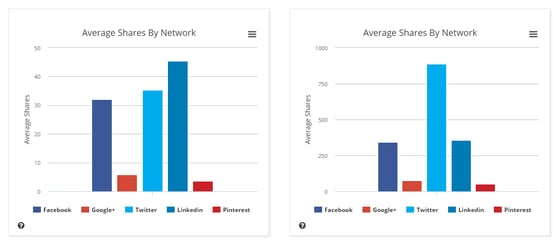As much as we want to believe we’re the best at what we do, competitor analysis data often shows that’s usually not the case. And I’m not being negative; there’s almost always somebody, somewhere, who has a better product or service than you do. Or, at the very least, is working hard to build, create, or invent a cheaper, more efficient alternative to whatever you offer. I’m sure there are people who would call this view cynical, but the reality is it’s simply a smart way to run a business.
The point is, even if your product or service is the best right now, there’s no guarantee it’ll stay that way. Likewise, your brand might be running the best marketing campaigns since sliced bread; multiple pages ranking number one on Google for varying keywords, tons of social media engagement and conversion rates you have to see to believe. But your competitors are out there trying to do better. And not just that, they’re specifically analyzing what you’re doing and devising ways to improve on it. You better believe the business world is that tough, or else you don’t stand a chance.
It’s not all doom and gloom, though, because that’s not what we’re about. We want to help you do better marketing, and in this particular case, there’s an opportunity to learn by comparing yourself to your most successful competitors. The formula is simple: what you currently do + what “they” do better = the best marketing strategy data can buy.
Understanding Comparison Websites and Marketing Data Insights
Now, then, onward to the comparisons! Before we proceed, you might wonder, what is a comparison website? In the context of digital marketing, a comparison website is a platform aggregating data from various sources, allowing users to compare products, services, or performance metrics side by side. These sites utilize extensive comparison web data to provide valuable insights into market trends and competitor strategies. By leveraging this information, you can identify areas where your business excels and aspects needing improvement.
You can use many tools to compare your marketing efforts to those of a competitor: Google Analytics, Semrush, gShift, Moz. All of these tools will provide useful comparisons. For the purposes of this blog post, I’m going to use BuzzSumo - a tool I love - to compare our blog to one of our Partners’ blogs, none other than industry giant HubSpot. Here’s what we learned:
The Bird's Eye View: Conduct Market Research to See How You're Different
So, we start at the beginning, with a general overview of content data from our blog and HubSpot's marketing blog.
The first thing you'll notice is that HubSpot pushes out a lot more content than we do. But that's not surprising; they're a different kind of company and much bigger. We operate in the same industry, yes, and we're competing for industry authority in certain spaces, but they've got a wider audience and, as such, need to create more content. In any comparison to a competitor, there are certain things you should expect to find and for us, this was one of them.
Even though we expected to be dwarfed by the sheer amount of content HubSpot churns out, it's still healthy for us to ask questions. Should we be creating more content? Is our current content output performing well? How would we ramp things up? We're excited by the fact we consistently because that's a significant increase from two years ago. Given that HubSpot is having success with creating such a large amount of content, it seems likely we should consider it. We haven't even really started yet, and we already have some information we can use!
Take A Hint From Your Network
Next up is a side-by-side view of the two blogs' shares by social network.
The interesting thing here is that the WSI blog has a more proportional share of data than HubSpot. A significantly higher percentage of HubSpot's blog shares come from Twitter, with easily more than double their next most popular channel. By contrast, the number of shares the WSI blog receives from LinkedIn, Twitter, and Facebook is fairly even.
My second observation is these two blogs have slightly different social audiences. As mentioned, HubSpot sees the most shares of their blog content on Twitter, while we see the most shares on LinkedIn. This seems to present an opportunity since we might have a more valuable audience on LinkedIn than HubSpot does. Any time you spot a chance to outperform a big competitor, you take it. The takeaway from this chart is that we should have a conversation about putting even more effort and energy into our LinkedIn presence.
Shorter Isn't Better: Applying a Competitive Analysis Framework
You'll have a hard time convincing the droves of people who believe, "Nobody reads on the Internet!" but shorter blog posts aren't better than longer, more in-depth posts. At least in terms of gaining attention and generating links and shares, and that is the business we're in, right? We've discussed similar charts and results before, but here is the most recent data on the two blogs' shares by content length.
What I immediately see in this data is if we do decide to go ahead with producing more content, it should be more of the longer variety (perhaps even longer than anything we currently have). From our data, you can see that 1000 to 2000-word posts outperform posts that are under 100 words; meanwhile, HubSpot's data clearly indicates that the longer a post is, the better it performs. Of course, it's assumed that you can't just publish 2500 words of drivel and expect your share rates to go up. But if we were to posts longer articles of similar quality to our current content, it seems like we could reasonably expect similar result's to HubSpot.
Popularity Contest: Identify Competitor Data and Metrics that Matter
To cap things off, I thought it'd be fun to look at the most popular post on each blog. For HubSpot, it was a post called The Top Types of AI-Generated Content in Marketing [New Data, Examples & Tips], which, with that title, is pretty self-explanatory. It's a good post with some great tips, but I don't see what makes it stand out so much from their other posts (although the post only received a little more than their average number of shares per post, so they are consistent across the board).
In terms of the WSI blog, our most popular post was What is a Landing Page & Why is it Important? So, for us, our most successful post was focused on the importance of landing pages in digital marketing, detailing their role in lead conversion, SEO benefits, and best practices for maximizing effectiveness. This means people are looking at us as an authority and look to the WSI network for updates and advice, which are two of the main goals of the blog.
Understanding Your Place in the Competitive Landscape
To fully understand your market position, a competitive analysis is essential for identifying direct and indirect competitors. By conducting a competitor analysis, you can uncover specific strengths and areas for improvement within your own approach, providing insight into what drives success for others in your industry. With tools like BuzzSumo or SEMrush, you can examine metrics such as search engine rankings, social engagement, and content themes to better align your strategies with market demands. Recognizing where you stand in the competitive landscape empowers you to make informed adjustments that enhance your brand’s visibility and relevance.
Analyzing Content Depth: Finding the Right Balance
When analyzing competitors, consider not just the quantity of their content but its depth and value. A SWOT analysis of competitor content can reveal what similar businesses offer in terms of detailed, engaging posts versus quick, surface-level updates. For example, shorter content may generate clicks, but in-depth articles often drive higher engagement and shareability across platforms. Examining these strengths and weaknesses in competitor content gives you a framework for adjusting your content length and quality to match your audience’s preferences, ensuring you’re consistently meeting – and exceeding – their expectations.
Tracking Industry Trends with Competitive Analysis Tools
Keeping up with industry trends is vital, and using a competitor analysis tool helps you identify shifting dynamics in your market. Tools like SEMrush or Google Analytics can highlight which marketing channels are trending and where competitors are gaining traction. By tracking competitor metrics such as customer engagement and content themes, you’ll stay responsive to changing market trends and better understand what resonates with your target audience. Adapting to these insights lets you maintain a competitive edge, keeping your business strategy relevant and primed for growth.
Leveraging AI for Comprehensive Competitor Analysis
AI-driven competitor analysis tools offer potent insights, allowing business owners and marketers to conduct competitive analyses more accurately and efficiently. These tools streamline the process of identifying direct competitors, analyzing their market share, and uncovering competitive advantages they may hold. By evaluating customer reviews, AI can help you understand what competitors in your industry offer and how their products and services compare to yours. This data provides insights into how competitors use content marketing, giving you an idea of which marketing tactics resonate most effectively. For those considering a new product or service, AI-driven analysis can reveal gaps left by potential competitors, enabling you to refine your own strategies. Whether you’re a marketer seeking to stay ahead of industry trends or a business owner looking to adapt to new competitors, AI-enhanced competitor analysis enables a detailed view of the competitive landscape, supporting smarter, more data-driven decisions.
When it's all said and done, taking a hard look at how you stack up against one of your main competitors - or even just a company that you want to model yourself after - is going to help you make your company better. At WSI, we believe that assessing these insights reveals new ideas and motivates you to push forward in a competitive landscape. Along the way, you’ll refine your approach, gain clarity on market needs, and, through competitor analysis data, develop a realistic understanding of what it takes to succeed. Contact us to learn more about leveraging these strategies effectively.






